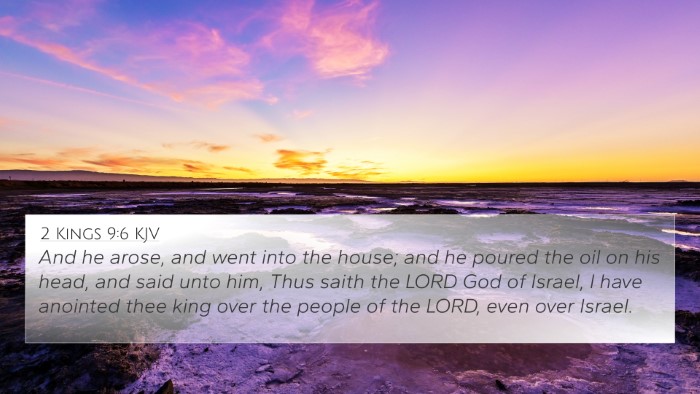Exploration of 1 Samuel 16:13
Bible Verse: 1 Samuel 16:13 - "Then Samuel took the horn of oil, and anointed him in the midst of his brethren: and the Spirit of the LORD came upon David from that day forward. So Samuel rose up, and went to Ramah."
Context and Significance
This pivotal moment in 1 Samuel 16 marks the anointing of David as king over Israel. This was significant not only historically but theologically, as it illustrates God's choice of leaders based on His divine will rather than human criteria.
Commentary Insights
Matthew Henry: Henry emphasizes the choice of David as a man after God's own heart, showcasing God's preference for inner character over outward appearances. He notes that David's anointing was not merely a recognition of potential but an installation of divine purpose, indicating that the Spirit's empowerment was essential for his future role as king.
Albert Barnes: Barnes reflects on the significance of the oil in this anointing, suggesting that the oil symbolizes the Holy Spirit, which empowers David for his kingship. He also elucidates that this act fulfilled God's promise and established a new covenantal relationship with the nation of Israel through David.
Adam Clarke: Clarke discusses the sociopolitical ramifications of David's anointing in the presence of his brothers, which indicates divine favor and sets the stage for the future conflict with Saul. He notes the immediate descent of the Spirit, highlighting the importance of Divine support in leadership.
Thematic Connections and Cross-References
This verse is linked to other themes and narratives in Scripture, illustrating the consistency of God's dealings with humanity throughout the Bible.
- 1 Samuel 10:1 - Saul's anointing as the first king of Israel, paralleling David's anointing.
- Psalms 23:5 - David’s experience of being anointed and God’s provision, drawing a spiritual parallel to the shepherd king's role.
- Acts 13:22 - A New Testament reflection on God’s choice of David, affirming his heart after God’s own.
- 1 Samuel 13:14 - God's rejection of Saul and the qualities of a king suitable for His purposes.
- 1 Chronicles 12:22 - Demonstrates the gathering support for David's kingship, indicating God's plan to establish him.
- Matthew 1:6 - The genealogy of Jesus, showcasing David’s importance in the messianic line.
- Luke 1:32-33 - Connection between David and Jesus, emphasizing the everlasting kingdom promised through David’s lineage.
- Hebrews 1:5 - The declaration of Jesus as God's Son, paralleled to David's anointing and “sonship” in the line of kings.
- 2 Samuel 5:3 - David’s eventual kingship, fulfilled after a period of waiting and conflict, linking back to his anointing.
- Romans 11:29 - Discusses the irrevocable gifts of God, highlighting the covenant with David as part of God's faithfulness.
Practical Applications
The anointing of David teaches valuable lessons applicable to readers today:
- Divine Selection: God looks at the heart and the intentions behind our actions.
- Empowerment for Leadership: The Holy Spirit's role in equipping individuals for a divinely appointed task.
- Faithfulness in Waiting: David's journey teaches the importance of trusting God’s timing and plan.
- Legacy of Faith: Understanding our place in God’s narrative can inspire faithfulness across generations.
Conclusion
1 Samuel 16:13 highlights a significant transition in Israel's leadership, with themes that resonate throughout Scripture. The verse prompts readers to explore the implications of God's choices and the nature of divine authority in leadership roles. Through cross-referencing with other Scriptures, one can glean insights into the interwoven narrative of God's relationship with humanity.
SEO Keywords Implementation
By examining the connections between Bible verses—including this significant passage from 1 Samuel 16:13—readers can enhance their understanding of Biblical themes and narratives. Utilizing tools for Bible cross-referencing and related resources can aid in deeper Bible study and sermon preparation, facilitating a comprehensive understanding of scripture.

















